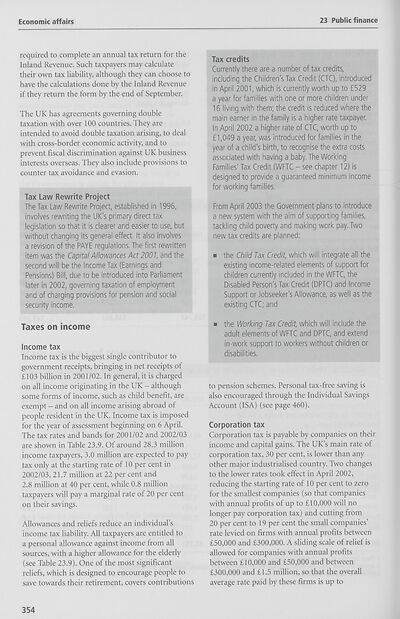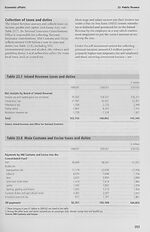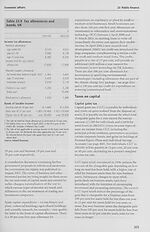Download files
Complete book:
Individual page:
Thumbnail gallery: Grid view | List view

Economic affairs
23 Public finance
required to complete an annual tax return for the
Inland Revenue. Such taxpayers may calculate
their own tax liability, although they can choose to
have the calculations done by the Inland Revenue
if they return the form by the end of September.
The UK has agreements governing double
taxation with over 100 countries. They are
intended to avoid double taxation arising, to deal
with cross-border economic activity, and to
prevent fiscal discrimination against UK business
interests overseas. They also include provisions to
counter tax avoidance and evasion.
Tax Law Rewrite Project
The Tax Law Rewrite Project, established in 1996,
involves rewriting the UK's primary direct tax
legislation so that it is clearer and easier to use, but
without changing its general effect. It also involves
a revision of the PAYE regulations. The first rewritten
item was the Capital Allowances Act 2001, and the
second will be the Income Tax (Earnings and
Pensions) Bill, due to be introduced into Parliament
later in 2002, governing taxation of employment
and of charging provisions for pension and social
security income.
Taxes on income
Income tax
Income tax is the biggest single contributor to
government receipts, bringing in net receipts of
£103 billion in 2001/02. In general, it is charged
on all income originating in the UK - although
some forms of income, such as child benefit, are
exempt - and on all income arising abroad of
people resident in the UK. Income tax is imposed
for the year of assessment beginning on 6 April.
The tax rates and bands for 2001/02 and 2002/03
are shown in Table 23.9. Of around 28.3 million
income taxpayers, 3.0 million are expected to pay
tax only at the starting rate of 10 per cent in
2002/03, 21.7 million at 22 per cent and
2.8 million at 40 per cent, while 0.8 million
taxpayers will pay a marginal rate of 20 per cent
on their savings.
Allowances and reliefs reduce an individual’s
income tax liability. All taxpayers are entitled to
a personal allowance against income from all
sources, with a higher allowance for the elderly
(see Table 23.9). One of the most significant
reliefs, which is designed to encourage people to
save towards their retirement, covers contributions
Tax credits
Currently there are a number of tax credits,
including the Children's Tax Credit (CTC), introduced
in April 2001, which is currently worth up to £529
a year for families with one or more children under
16 living with them; the credit is reduced where the
main earner in the family is a higher rate taxpayer.
In April 2002 a higher rate of CTC, worth up to
£1,049 a year, was introduced for families in the
year of a child's birth, to recognise the extra costs
associated with having a baby. The Working
Families' Tax Credit (WFTC - see chapter 12) is
designed to provide a guaranteed minimum income
for working families.
From April 2003 the Government plans to introduce
a new system with the aim of supporting families,
tackling child poverty and making work pay. Two
new tax credits are planned:
■ the Child Tax Credit, which will integrate all the
existing income-related elements of support for
children currently included in the WFTC, the
Disabled Person's Tax Credit (DPTC) and Income
Support or Jobseeker's Allowance, as well as the
existing CTC; and
■ the Working Tax Credit, which will include the
adult elements of WFTC and DPTC, and extend
in-work support to workers without children or
disabilities.
to pension schemes. Personal tax-free saving is
also encouraged through the Individual Savings
Account (ISA) (see page 460).
Corporation tax
Corporation tax is payable by companies on their
income and capital gains. The UK’s main rate of
corporation tax, 30 per cent, is lower than any
other major industrialised country. Two changes
to the lower rates took effect in April 2002,
reducing the starting rate of 10 per cent to zero
for the smallest companies (so that companies
with annual profits of up to £10,000 will no
longer pay corporation tax) and cutting from
20 per cent to 19 per cent the small companies’
rate levied on firms with annual profits between
£50,000 and £300,000. A sliding scale of relief is
allowed for companies with annual profits
between £10,000 and £50,000 and between
£300,000 and £1.5 million, so that the overall
average rate paid by these firms is up to
354
23 Public finance
required to complete an annual tax return for the
Inland Revenue. Such taxpayers may calculate
their own tax liability, although they can choose to
have the calculations done by the Inland Revenue
if they return the form by the end of September.
The UK has agreements governing double
taxation with over 100 countries. They are
intended to avoid double taxation arising, to deal
with cross-border economic activity, and to
prevent fiscal discrimination against UK business
interests overseas. They also include provisions to
counter tax avoidance and evasion.
Tax Law Rewrite Project
The Tax Law Rewrite Project, established in 1996,
involves rewriting the UK's primary direct tax
legislation so that it is clearer and easier to use, but
without changing its general effect. It also involves
a revision of the PAYE regulations. The first rewritten
item was the Capital Allowances Act 2001, and the
second will be the Income Tax (Earnings and
Pensions) Bill, due to be introduced into Parliament
later in 2002, governing taxation of employment
and of charging provisions for pension and social
security income.
Taxes on income
Income tax
Income tax is the biggest single contributor to
government receipts, bringing in net receipts of
£103 billion in 2001/02. In general, it is charged
on all income originating in the UK - although
some forms of income, such as child benefit, are
exempt - and on all income arising abroad of
people resident in the UK. Income tax is imposed
for the year of assessment beginning on 6 April.
The tax rates and bands for 2001/02 and 2002/03
are shown in Table 23.9. Of around 28.3 million
income taxpayers, 3.0 million are expected to pay
tax only at the starting rate of 10 per cent in
2002/03, 21.7 million at 22 per cent and
2.8 million at 40 per cent, while 0.8 million
taxpayers will pay a marginal rate of 20 per cent
on their savings.
Allowances and reliefs reduce an individual’s
income tax liability. All taxpayers are entitled to
a personal allowance against income from all
sources, with a higher allowance for the elderly
(see Table 23.9). One of the most significant
reliefs, which is designed to encourage people to
save towards their retirement, covers contributions
Tax credits
Currently there are a number of tax credits,
including the Children's Tax Credit (CTC), introduced
in April 2001, which is currently worth up to £529
a year for families with one or more children under
16 living with them; the credit is reduced where the
main earner in the family is a higher rate taxpayer.
In April 2002 a higher rate of CTC, worth up to
£1,049 a year, was introduced for families in the
year of a child's birth, to recognise the extra costs
associated with having a baby. The Working
Families' Tax Credit (WFTC - see chapter 12) is
designed to provide a guaranteed minimum income
for working families.
From April 2003 the Government plans to introduce
a new system with the aim of supporting families,
tackling child poverty and making work pay. Two
new tax credits are planned:
■ the Child Tax Credit, which will integrate all the
existing income-related elements of support for
children currently included in the WFTC, the
Disabled Person's Tax Credit (DPTC) and Income
Support or Jobseeker's Allowance, as well as the
existing CTC; and
■ the Working Tax Credit, which will include the
adult elements of WFTC and DPTC, and extend
in-work support to workers without children or
disabilities.
to pension schemes. Personal tax-free saving is
also encouraged through the Individual Savings
Account (ISA) (see page 460).
Corporation tax
Corporation tax is payable by companies on their
income and capital gains. The UK’s main rate of
corporation tax, 30 per cent, is lower than any
other major industrialised country. Two changes
to the lower rates took effect in April 2002,
reducing the starting rate of 10 per cent to zero
for the smallest companies (so that companies
with annual profits of up to £10,000 will no
longer pay corporation tax) and cutting from
20 per cent to 19 per cent the small companies’
rate levied on firms with annual profits between
£50,000 and £300,000. A sliding scale of relief is
allowed for companies with annual profits
between £10,000 and £50,000 and between
£300,000 and £1.5 million, so that the overall
average rate paid by these firms is up to
354
Set display mode to:
![]() Universal Viewer |
Universal Viewer | ![]() Mirador |
Large image | Transcription
Mirador |
Large image | Transcription
The item on this page appears courtesy of Office for National Statistics and may be re-used under the Open Government Licence for Public Sector Information.
| Britain and UK handbooks > UK: The official yearbook of the United Kingdom of Great Britain and Northern Ireland > 2003 > (392) |
|---|
| Permanent URL | https://digital.nls.uk/204928206 |
|---|
| Attribution and copyright: |
|
|---|---|
| Description | Three volumes of 'UK: The official yearbook of the United Kingdom of Great Britain and Northern Ireland', published annually by the Office of National Statistics from 2002-2005. |
|---|---|
| Shelfmark | GII.11 SER |
| Description | Three titles produced by the British Government from 1954-2005 describing 'how Britain worked'. They are: 'Britain: An official handbook' (1954-1998), 'Britain: The official yearbook of the United Kingdom' (1999-2001), and 'UK: The official yearbook of the United Kingdom of Great Britain and Northern Ireland' (2002-2005). These 50 reports provide an overview of Britain's economic, social and cultural affairs, its environment, international relations, and the systems of government. They give an impartial summary of government policies and initiatives, and explain how public services are organised. |
|---|---|
| Additional NLS resources: |
|

